In this edition of the Court judgements review, we look at the Supreme Court’s judgement on the applicability of insurance policy, Delhi High Court’s judgements on the Right to Reproductive choices, and coercion of victims to reveal passwords of digital devices, Calcutta High Court’s decision on balancing the right to privacy of biological parent and right of an adopted child, and Guwahati High Court’s judgement on promotion of employees.
Supreme Court: Insurance policy becomes effective from the date of issuance and not the date of proposal or date of issuance of receipt.
The Supreme Court, in Reliance Life Insurance Company Ltd. & Anr. vs. Jaya Wadhwani, held that the date of issuance of an insurance policy is the date from which it is effective, and not the date of the policy or the premium deposit date.
The division bench of the apex court comprising of Justice Vikram Nath and Justice Rajesh Bindal was hearing two appeals regarding the date of commencement of the insurance policy. In the present case, the earlier judicial forums such as the District Consumer Disputes Redressal Forum, the State Consumer Disputes Redressal Commission, and the National Commission, held that the date of issuance of the initial deposit receipt of premium is the date of commencement of the Policy. The appeal is against these judgements.
The facts of the case are as follows. The life assured submitted the proposal form on 26 September 2012. The policy was issued and commenced on 28 September 2012, with the next premium due on 28 September 2013. The grace period is 30 days under Clause 1(iv) of the terms and conditions. Since the subsequent premium was not paid, the policy lapsed. The assured reinstated the lapsed policy by paying the overdue premium on 25 February 2014. However, on 03 June 2014, the life assured committed suicide. This was well within the 12 months after the reinstatement of the policy, which is the requirement as per the insurance policy.

In the earlier judicial forums, only the date of the issue of policy was considered. The date of reinstatement was not considered, which is a wrongful reading of the clauses. In another appeal case tagged with this, the policy form was submitted on 14 July 2012, while the policy was issued on 16 July 2012. The next instalment was on 16 July 2013. However, the petitioner committed suicide on 15 July 2013, the last day of the 12-month duration gap. In this case, though the cheque was submitted on 14 July 2012, the policy was issued on 16 July 2012 post cheque clearance.
The apex court relied on its earlier judgement in Life Insurance Corporation of India and Another vs. Dharam Vir Anand, whereby it was held that in construing a particular clause of the contract, it is only reasonable to construe that the word and the terms used therein must be given effect to.
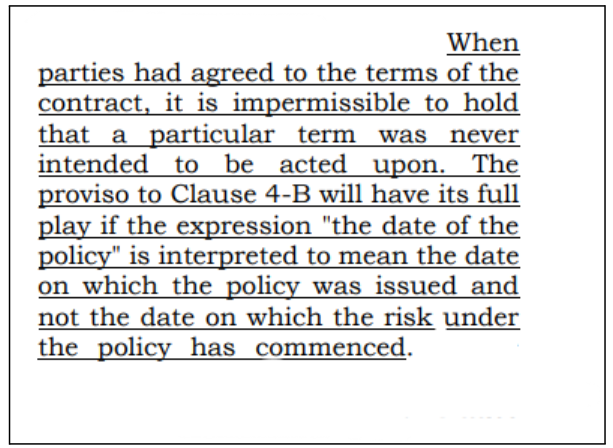
A similar observation was made again in Life Insurance Corporation. of India vs. Mani Ram, whereby it was held that even if the policy had a clause regarding the backdating, the date of policy issuance would still be a relevant date.
Accordingly, the earlier orders are set aside, and the insurance claims of the respondents are rejected.
Delhi HC: The right to reproductive choice also includes the right not to procreate- it is ultimately the prerogative of the women to evaluate and decide on the course of action, if any material circumstances change.
The Delhi High Court, in R vs. The Union of India held that reproductive autonomy is closely linked with bodily autonomy, and the decision to have or not have pregnancy is the prerogative of the woman, if there is any change in the material circumstances of women.
The single judge bench of Justice Subramonium Prasad was hearing a petition for a direction to the Respondents to permit medical termination of the ongoing pregnancy of the Petitioner under the Medical Termination of Pregnancy Act, 1971 and the Medical Termination of Pregnancy Rules, 2003.
The facts of the case are as follows. The petitioner got married on 26 February 2023 and unfortunately, her husband died on 19 October 2023. During an ultrasound on 31 October 2023, it was determined that she was 20 weeks pregnant. Subsequently, in December 2023, she sought medical termination of the pregnancy, but due to her gestation being beyond 24 weeks, she was denied. Upon approaching the apex court, it constituted a medical board to assess whether the petitioner could undergo termination of pregnancy. The board declined termination citing Clause 3B(c) of the MTP Rules, allowing termination only up to 24 weeks, while the foetus was reportedly at 29 weeks. Subsequently, the petitioner submitted that she was suffering from trauma, for which the court recommended psychiatric evaluation was done by AIIMS. The report advised the petitioner to undergo treatment for depressive symptoms and supervised care by family members. The question before the court is whether to allow the termination of pregnancy.
The court looked at relevant provisions, including clause 3B(c) of the MTP Rules, 2003.
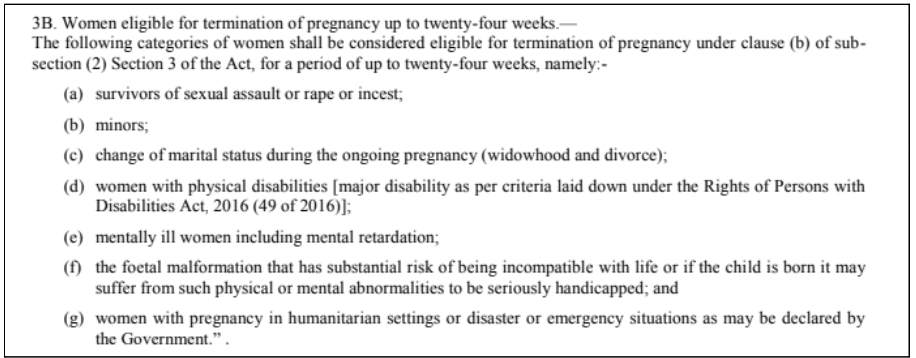
While the petitioner became a widow in October 2023, she decided to terminate her pregnancy in December 2023. The court relied on the apex court judgement in X vs. Principal Secretary, Health and Family Welfare Department, Govt. of NCT of Delhi and Another, wherein a similar situation was dealt with. In that case, the apex court remarked that any alteration in significant circumstances understandably influences a woman’s assessment of her capability to nurture a child and her inclination to proceed with the pregnancy. Moreover, the choice to give birth to and nurture a child is inherently shaped by one’s material conditions. These encompass a woman’s situational, social, and financial circumstances, which can significantly impact her decision regarding the continuation of the pregnancy. Each woman’s circumstances are unique, and it is ultimately the prerogative of each woman to evaluate her life and arrive at the best course of action.
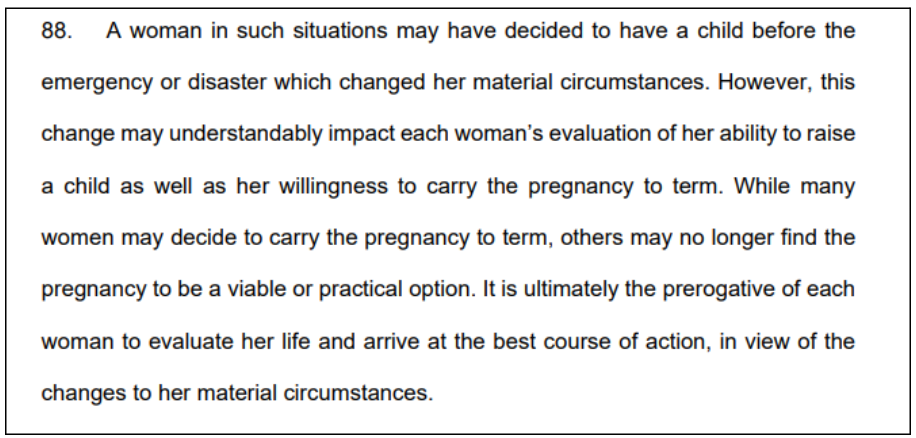
Further, the court remarked that the right to control one’s reproductive choices is intricately connected to the right to bodily autonomy. The profound impact of an undesired pregnancy on a woman’s physical and mental well-being should not be underestimated. The decision to either see the pregnancy through to its completion or opt for termination is fundamentally grounded in the pregnant woman’s right to bodily autonomy and decision-making independence.
The court further referred to Suchita Srivastava & Anr vs. Chandigarh Administration, whereby it was held that the right to reproductive choices also includes the right not to procreate.
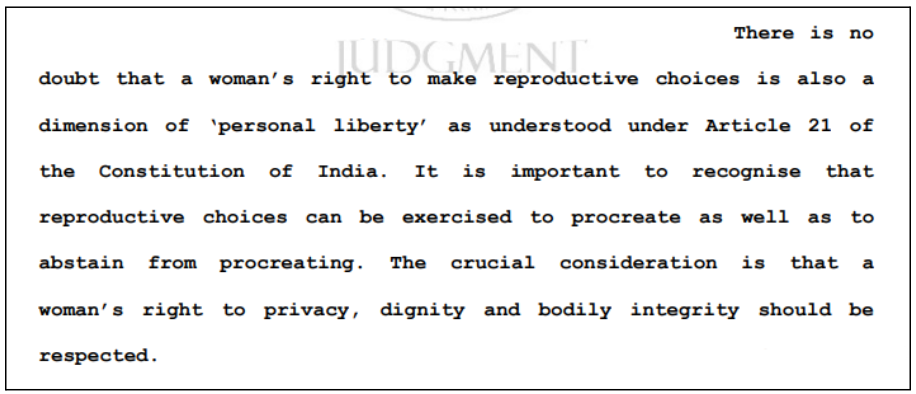
Considering the above judicial remarks, the Delhi High Court permitted the petitioner to terminate the pregnancy. Accordingly, the petition is disposed of.
Calcutta HC: Right of an adopted child shall not infringe the right to privacy of the biological parents.
The Calcutta High Court, in Fabian Ricklin, alias Ranabir vs. State of West Bengal & Ors., held that the rights of privacy of biological parents prevail over the right of an adopted child and that the necessity for maintaining the privacy of the biological mother must be construed in consideration of the petitioner’s right to identity, which forms an inherent aspect of his right to live with dignity and express himself.
The single judge bench of Justice Sabyasachi Bhattacharyya was hearing a petition of a Swiss citizen to do a ‘root search’ for his biological parents. The petitioner sought the relinquishment deed which ought to be executed by the biological mother to facilitate the process of adoption. The petitioner relied on the apex court judgement in Laxmi Kant Pandey vs. Union of India, which laid down guidelines for the adoption of Indian children to foreign parents, which included the preservation of records by the adoption agencies. The said agency now pleads that they do not own the deed of relinquishment.
However, the adoption agency argued that the legislation mandating record-keeping was established from 2017 onward, without retroactive application for maintaining records. Further, it is argued that the mother’s right to privacy supersedes the child’s right to discover the mother’s identity, particularly when the mother chooses not to disclose it.
The court framed the following issues in the present case:
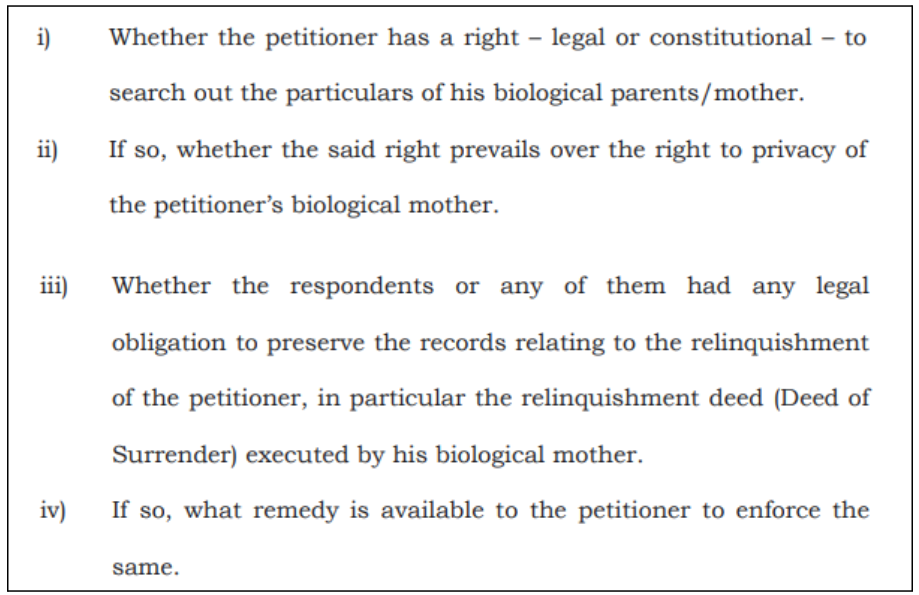
Firstly, the court recognized that there are different timelines involved in this case. The legal regulations during the petitioner’s adoption and those governing the process of searching for biological roots (first codified in 2017 adoption regulations, and subsequently in 2022) differ to some extent. The court looked at section 47 of the 2022 regulations that described root search, and subclause 6 of this provided for the right of privacy of biological parents over the rights of an adopted child.
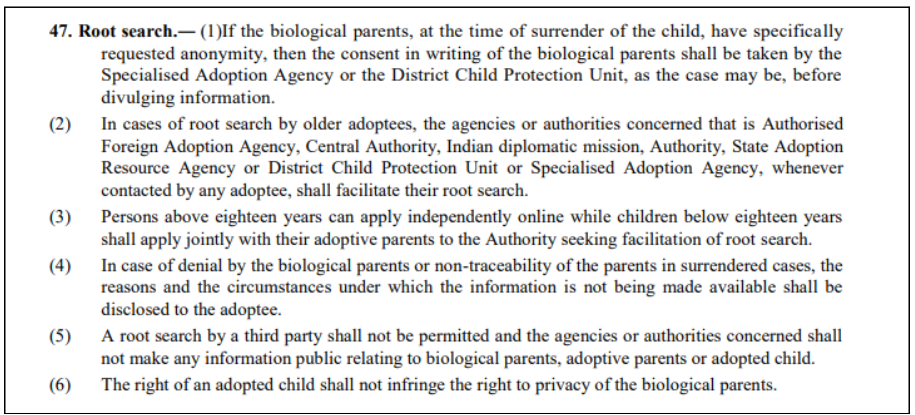
Further, clause 7 of the same regulations distinguishes between a female biological parent who is a single mother/unwed mother or when a child is born out of wedlock on the one hand and biological parents in general on the other, and thereby specify different modalities of the purpose of surrender. Clause 20 also envisions strict confidentiality of documents on biological parents.
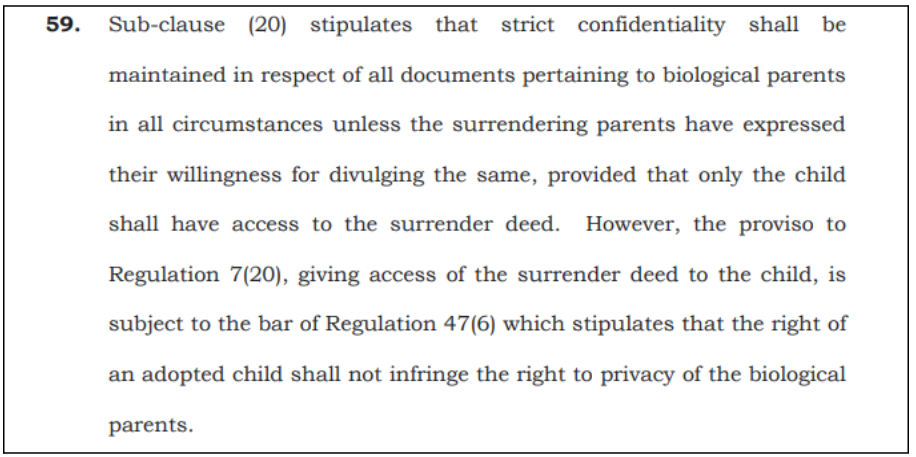
Looking at the above provisions, the court remarked that the petitioner undeniably possesses a legal and constitutional entitlement to seek out the details of their biological parents or mother. However, this right is subject to and secondary to the right to privacy held by the adoptee’s biological mother or parent.
Accordingly, the petition is dismissed.
Delhi HC: The accused cannot be coerced to reveal/ disclose the password(s) or any other like details in view of the protection guaranteed to him under the Constitution of India.
The Delhi High Court, in Sanket Bhadresh Modi vs. Central Bureau of Investigation & Anr., held that the investigating agency cannot coerce the accused to reveal/disclose passwords as the right against self-incrimination is guaranteed under 20(3) of the Indian Constitution.
The single judge bench of Justice Saurabh Banerjee was hearing a bail petition of an applicant who, along with at least 12 others, was reprimanded for making millions of spam phone calls to the USA from fraud call centres located in India and as such, had defrauded and cheated US Citizens to the tune of about 20 million USD.
The counsel for the appellant argued that the applicant was under protective arrest for approximately 203 days, during which there was no misuse of the granted liberty. The applicant meets the criteria for bail, and denial cannot be based solely on non-cooperation, as an accused cannot be compelled to self-incriminate by cooperating with the investigating agency. Given the anticipated lengthy trial duration, keeping the applicant detained serves no meaningful purpose.
The CBI’s counsel argued that the applicant, as the company’s Director implicated in the FIR, engaged in fraudulent activities impacting India’s international image. Consequently, strict legal measures are warranted. Additionally, the investigation is in its early stages, and the concern is that if the applicant is granted bail, there’s a risk of witness intimidation or evidence tampering.
Upon hearing the arguments from both parties, the court looked at the facts and circumstances of the case. The court noted that primary evidence such as laptops, mobile phones, and other sophisticated gadgets, all of which have already been seized and are currently in the possession of the Investigating Agency. Consequently, if bail is granted, there’s minimal chance of the applicant tampering with this evidence. The court pointed out in the submissions by the CBI, that the agency is waiting for the applicant to share the password(s) to unlock the gadgets/ digital devices during the investigation and the applicant is not cooperating qua that at his end. Accordingly, it held that,
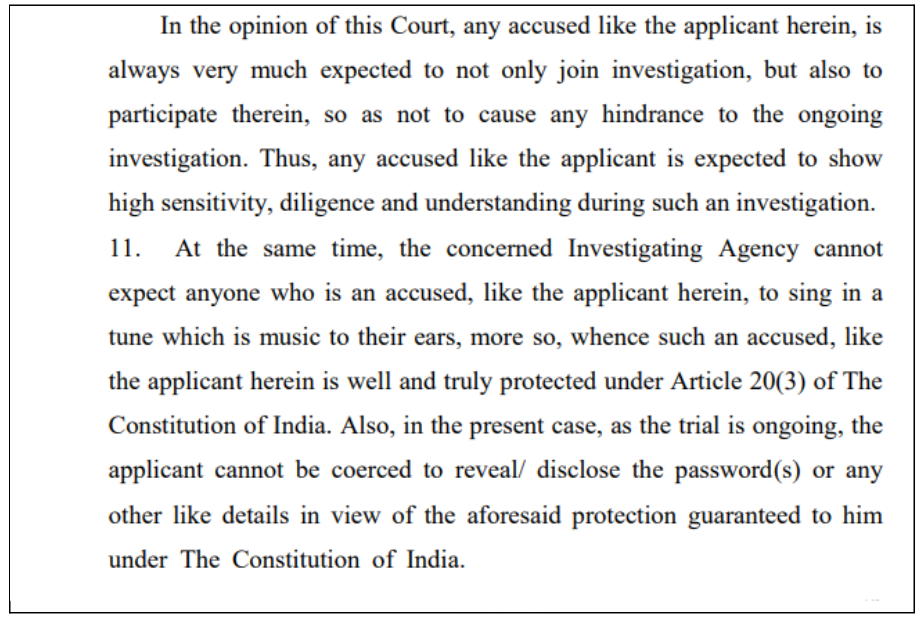
Relying on other apex court judgements on the accused being innocent till proven guilty, such as Hussainara Khatoon & Ors vs. Home Secretary, State of Bihar, and Satender Kumar Antil vs. Central Bureau of Investigation, the Delhi High Court remarked that the factual scenario coupled with the legal position at hand, it would be in the interest of justice, if the applicant is released on bail. Accordingly, a conditional bail is granted to the applicant.
Gauhati HC: Denying promotion, despite being eligible and availability of vacancies, amounts to violation of fundamental right of consideration for promotion.
In Syed Habibur Rahman vs. The State of Assam & 2 Ors., The Gauhati High Court ruled that the right to be considered for promotion is an aspect of a fundamental right. Denying individuals falling within the zone eligible for promotion not only deprives them of the fulfilment of career progression but also deprives them of subsequent financial advantages.
The single Judge bench of Justice Suman Shyam was hearing a petition, whereby the petitioner, post-retirement, was aggrieved that the officials did not evaluate his candidacy for promotion to the position of District Fisheries Development Officer regularly. The petitioner was initially appointed as a Fisheries Extension Officer and joined the department in 1982. In 1992, the petitioner was promoted to the position of Sub-Divisional Fisheries Development Officer (SDFDO). Subsequently, in 2005, the petitioner assumed the responsibilities of District Fisheries Development Officer (DFDO), despite not being officially promoted to that position regularly. The petitioner claims that despite being eligible and vacancies being available, his candidacy was not considered for promotion.
The counsel for the respondents argued that the petitioner had failed to complete the mandatory requirement of Post Graduate Training in Fishery Science in CIFRI/ CIFE, or any other equivalent training recognized by the ICAR for consideration for promotion to the post of DFDO.
Hearing arguments from both parties, the court remarked that since the petitioner had held the charge of the post of DFDO from the year 2005 till the date of his retirement on 31 December 2013, hence, the grounds for not considering the case of the petitioner are wholly unacceptable.
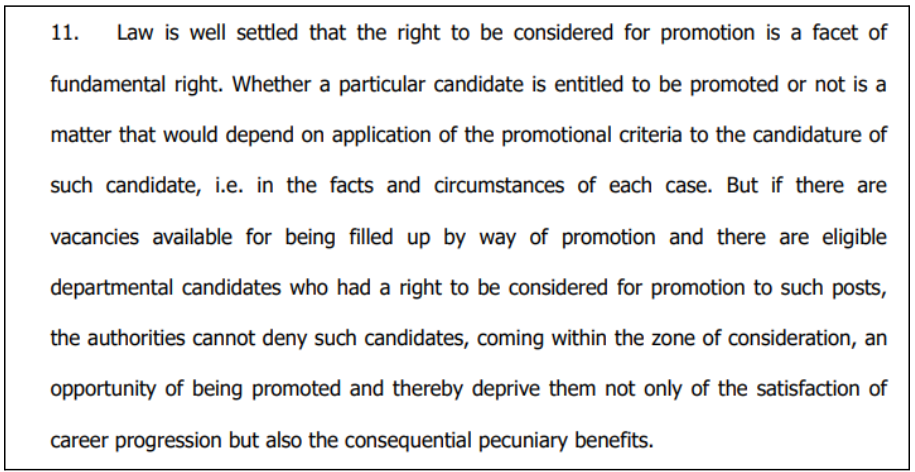
Accordingly, the petitioner is instructed to submit a fresh representation, ventilating his grievance in the matter, by enclosing a certified copy of this order and the appropriate order shall be passed within three months of the new representation.


